
A wedding is a ceremony where two people are united in marriage. Wedding traditions and customs vary greatly between cultures, ethnic groups, races, religions, denominations, countries, social classes, and sexual orientations. Most wedding ceremonies involve an exchange of marriage vows by a couple, presentation of a gift, and a public proclamation of marriage by an authority figure or celebrant. Special wedding garments are often worn, and the ceremony is sometimes followed by a wedding reception. Music, poetry, prayers, or readings from religious texts or literature are also commonly incorporated into the ceremony, as well as superstitious customs.

A ceremony is a unified ritualistic event with a purpose, usually consisting of a number of artistic components, performed on a special occasion.

A civil marriage is a marriage performed, recorded, and recognized by a government official. Such a marriage may be performed by a religious body and recognized by the state, or it may be entirely secular.

In Christian denominations that practice infant baptism, confirmation is seen as the sealing of the covenant created in baptism. Those being confirmed are known as confirmands. For adults, it is an affirmation of belief. The ceremony typically involves laying on of hands.

In denominations of Christianity, a godparent or sponsor is someone who bears witness to a child's baptism (christening) and later is willing to help in their catechesis, as well as their lifelong spiritual formation. In the past, in some countries, the role carried some legal obligations as well as religious responsibilities. In both religious and civil views, a godparent tends to be an individual chosen by the parents to take an interest in the child's upbringing and personal development, to offer mentorship or claim legal guardianship of the child if anything should happen to the parents. A male godparent is a godfather, and a female godparent is a godmother. The child is a godchild.

Igualada is a municipality and capital of Anoia county in Penedès, Catalonia, Spain. It is located on the left bank of the Anoia River and at the western end of the Igualada-Martorell-Barcelona Railway. Igualada is the capital and central market of the Anoia comarca, a rich agricultural and wine-producing district. Its population was 38,918 in 2009.

The Marriage Act 1961(Cth) is an act of the Parliament of Australia which regulates marriage in Australia. Since its passage in 1961, it has been amended on numerous occasions and applies uniformly throughout Australia (including its external territories); and any law made by a state or territory inconsistent with the Act is invalid. The Act was made under the power granted to the federal parliament under section 51(xxi) of the Australian Constitution. Before the passage of the Act, each state and territory had its own marriage laws. The Act only recognises monogamous marriages that comply with the requirements of the Act; other forms of union, including traditional Aboriginal marriages, are not recognised. However, the Family Law Act 1975 treats de facto relationships and polygamous marriages as marriages for the purpose of recognising the rights of parties at a breakup. Since 2009, the Family Law Act 2009 has also recognised the property rights of each partner of de facto relationships on separation.

Humanist Society Scotland is a Scottish registered charity that promotes humanist views and offers humanist wedding, funeral, and baby-naming ceremonies. It is a member of the European Humanist Federation and Humanists International.
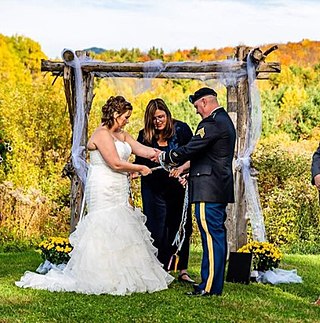
An officiant or celebrant is someone who officiates at a religious or secular service or ceremony, such as marriage, burial, namegiving or baptism.

In Australia, celebrants or civil celebrants are people who conduct formal ceremonies in the community, particularly weddings – which represent the main ceremony of legal import conducted by celebrants –, and for this reason are often referred to as marriage celebrants. They may also conduct extra-legal ceremonies such as naming of babies, renewal of wedding vows, funerals, divorces, becoming a teenager, changing name, significant birthdays, retirements, and other life milestones. Officiating at a marriage requires that the celebrant be an authorised marriage celebrant under Australian law, or the law where the marriage takes place, but officiating at non-legal ceremonies does not.
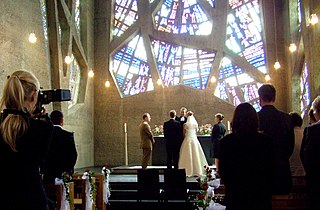
A marriage officiant or marriage celebrant is a person who officiates at a wedding ceremony.

A humanist celebrant or humanist officiant is a person who performs humanist celebrancy services, such as non-religious weddings, funerals, child namings, coming of age ceremonies and other rituals. Some humanist celebrants are accredited by humanist organisations, such as Humanists UK, Humanist Society Scotland (HSS), The Humanist Society (US), and the Humanist Association of Canada (HAC).
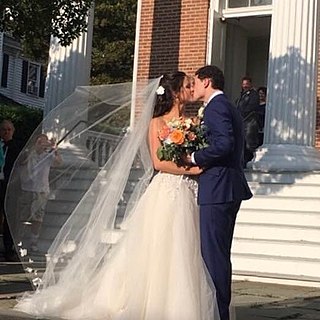
Celebrancy is a profession founded in Australia in 1973 by the then Australian attorney-general Lionel Murphy. The aim of the celebrancy program was to authorise persons to officiate at secular ceremonies of substance, meaning and dignity mainly for non-church people. Up until this point legal marriages were reserved only to clergy or officers of the Births, Deaths & Marriages registry office. These appointed persons, referred to in the Marriage Act of Australia as "authorised celebrants", create & conduct weddings, funerals, namings, house dedications, coming of age and other life ceremonies for those who do not wish to be married or have other ceremonies in a church or registry office.

A naming ceremony is a stage at which a person or persons is officially assigned a name. The methods of the practice differ over cultures and religions. The timing at which a name is assigned can vary from some days after birth to several months or many years.
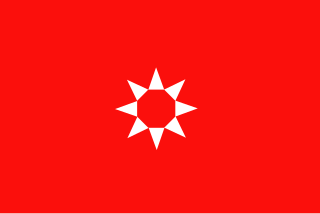
Rivas-Vaciamadrid is the 15th most populated city in the Community of Madrid, Spain. It belongs to the Madrid metropolitan area and is located just 15 km from central Madrid, to the south-east. In the southern part of the municipality, the Manzanares river flows into the Jarama, which is part of the Lower Manzanares and Jarama Rivers Regional Park. Almost three quarters of the municipality form part of the park, making it an important ecological centre with numerous lakes and various species of wildlife and fauna.

In Belgium, organized secularism is the local associations and organizations which provide moral support for naturalist, atheist, agnostic, secular humanist, freethinking, Bright, or irreligious and non-confessional citizens. A person who subscribes to such entities or ideologies, or at least espouses an interest in "free inquiry" apart from religious traditions is described as a "secular" or "free-thinker".

Marriage in New Zealand is governed by an Act of Parliament. The minimum marriage age is 18 years, or 16 years with consent of the Family Court. Polygamous marriages are not permitted in New Zealand. There are prohibitions of marriages between some relatives and some who are already in a civil union.
In the canon law of the Catholic Church, a person is a subject of certain legal rights and obligations. Persons may be distinguished between physical and juridic persons. Juridic persons may be distinguished as collegial or non-collegial, and public or private juridical persons. The Holy See and the Catholic Church as such are not juridic persons since juridic persons are created by ecclesiastical law. Rather, they are moral persons by divine law.

Marriage in Australia is regulated by the federal government, which is granted the power to make laws regarding marriage by section 51(xxi) of the constitution. The Marriage Act 1961 applies uniformly throughout Australia to the exclusion of all state laws on the subject.
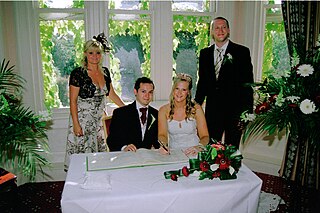
A civil, or registrar, ceremony is a non-religious legal marriage ceremony performed by a government official or functionary. In the United Kingdom, this person is typically called a registrar. In the United States, civil ceremonies may be performed by town, city, or county clerks, judges or justices of the peace, or others possessing the legal authority to support the marriage as the wedding officiant.

















